Cite this document
(“Nigeria's point of view in the UN SECURITY COUNCIL REFORMATION Essay”, n.d.)
Retrieved from https://studentshare.org/environmental-studies/1415517-nigeria-s-point-of-view-in-the-un-security-council
Retrieved from https://studentshare.org/environmental-studies/1415517-nigeria-s-point-of-view-in-the-un-security-council
(Nigeria'S Point of View in the UN SECURITY COUNCIL REFORMATION Essay)
https://studentshare.org/environmental-studies/1415517-nigeria-s-point-of-view-in-the-un-security-council.
https://studentshare.org/environmental-studies/1415517-nigeria-s-point-of-view-in-the-un-security-council.
“Nigeria'S Point of View in the UN SECURITY COUNCIL REFORMATION Essay”, n.d. https://studentshare.org/environmental-studies/1415517-nigeria-s-point-of-view-in-the-un-security-council.


